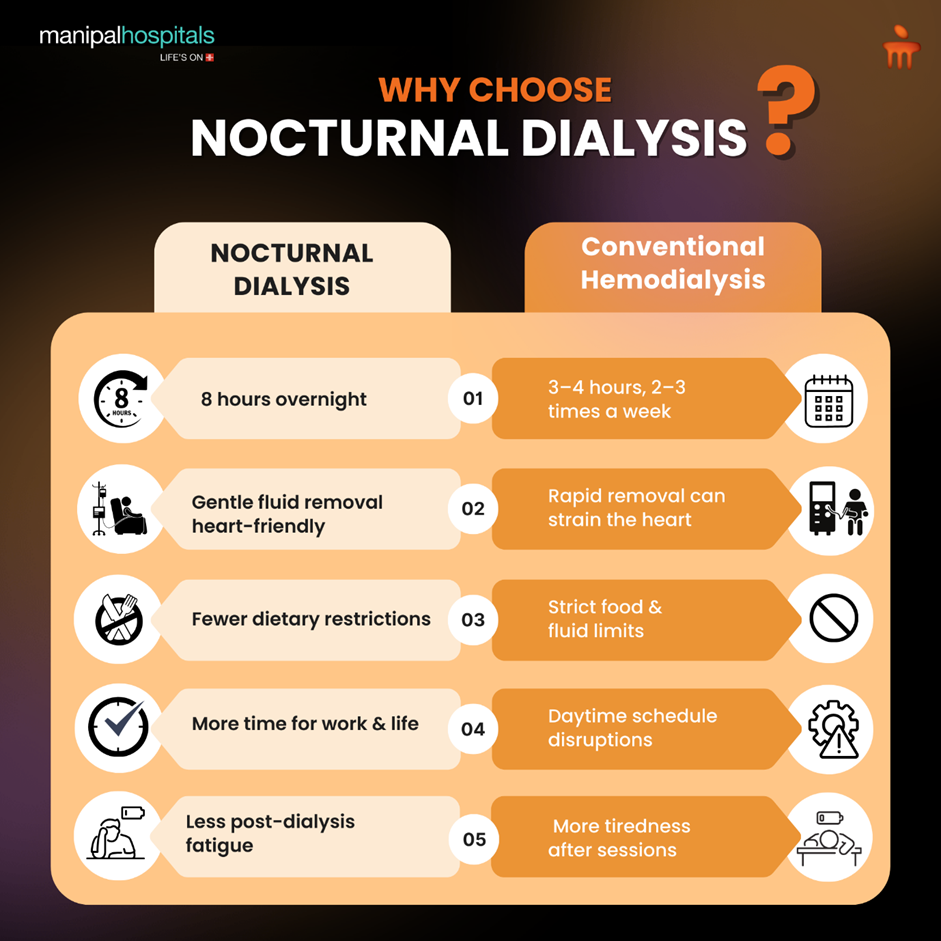
Are you tired of the tight schedules of regular dialysis? Are you looking for a more flexible treatment option? Nocturnal dialysis may be the best solution for you. Unlike traditional daytime sessions, overnight dialysis in Bangalore allows you to get your treatment as you sleep. This approach involves longer sessions, thus enhancing health outcomes. In this blog, a top nephrologist in Hebbal, Bangalore, discusses the benefits, difficulties, and different approaches to nocturnal or night-time dialysis and why this might be the right choice for you.
Synopsis
How is Nocturnal Dialysis Different from Traditional Haemodialysis?
Night-time dialysis is different from traditional day dialysis in several ways. It is normally performed at night when you are asleep, which enables longer and softer treatment sessions. Here are some key differences between dialysis at night and daytime dialysis:

-
Longer Treatment Sessions: Nocturnal dialysis takes 6 to 8 hours. This is better in terms of removing toxins and extra fluid from your body, something that is difficult to accomplish in shorter daytime sessions.
-
Improved Lifestyle Flexibility: Dialysis is conducted during the night; therefore, during the daytime, you can go to work, be with family, and engage in social activities, thereby sustaining the usual schedule.
-
Fewer Dietary Restrictions: You can enjoy a more relaxed diet because waste is cleared more efficiently overnight.
-
Lower Fatigue Levels: Many of us feel less tired after nocturnal dialysis, as the treatment is gentler and longer, preventing sudden drops in blood pressure.
-
Personalised Schedule: Dialysis can be tailored to fit your lifestyle, helping you balance treatment with your personal and professional commitments.
Health Benefits of Nocturnal Dialysis
Choosing night-time dialysis in Bangalore offers several essential health benefits that improve your daily living. This treatment helps your body cope better with kidney failure and its side effects. It also supports your heart health and overall well-being. Let’s see how nocturnal dialysis can make a big difference.
You can consult the best nephrologist at Manipal Hospital Hebbal, Bangalore, for expert advice.
-
Stronger Heart Health: Slow, gentle dialysis protects your heart by reducing fluid overload and stabilising blood pressure during treatments.
-
Effective Fluid Removal: More frequent and prolonged sessions help control swelling and fluid buildup, improving comfort and reducing complications.
-
Stable Blood Pressure: Gradual fluid removal during overnight dialysis prevents sudden blood pressure drops, keeping you more stable throughout the day.
-
Better Waste Clearance: Extended dialysis sessions remove toxins more effectively, helping to reduce symptoms such as itching and nausea.
-
Better Nutrient Balance: It helps to ensure that the healthier levels of minerals and nutrients, which can be challenging to manage with short-term treatments, are maintained.
-
Reduced Hospital Visits: Better management of your condition can lead to fewer emergency hospital visits, saving you time and reducing stress.
-
Enhanced Energy Levels: Many patients report feeling more energetic and able to enjoy daily activities after switching to nocturnal dialysis.
Managing Risks and Complications in Nocturnal Dialysis
Like any treatment, nocturnal dialysis in Bangalore comes with potential risks and complications. Being informed helps you manage them better, and your healthcare team will work closely with you to minimise these risks and ensure your safety.
-
Access Site Infections: The site where blood is accessed can sometimes get infected; good hygiene and regular checks help prevent this.
-
Muscle Cramps: Longer sessions may cause cramps, but adjusting your fluid and mineral intake usually helps reduce these.
-
Sleep Disruptions: Some of us may find sleeping hard during dialysis, but most adapt with time and minor changes.
-
Loss of Kidney Function: More frequent dialysis might affect your remaining kidney function, so your doctor will monitor this carefully.
-
Need for Home Safety: If you do home nocturnal dialysis, your space must be clean, safe, and equipped to handle emergencies.
-
Emotional Stress: Managing dialysis at home or overnight can feel overwhelming; support from family and doctors is essential.
-
Cost Considerations: Equipment and supplies may cost more, but insurance plans and government schemes often provide support.
Conclusion
If you are exploring options for kidney failure treatment, nocturnal dialysis can improve your quality of life. For comprehensive treatment for kidney failure at Manipal Hospital Hebbal, you can consult the best nephrologist in Hebbal, who can guide you on the advantages of nocturnal dialysis for working kidney patients. Always consult the best nephrologist in Hebbal or your local expert before deciding.
FAQ's
Nocturnal dialysis offers longer, slower sessions, allowing better toxin removal, improved heart health, and more energy. It also frees up your daytime schedule. In contrast, conventional hemodialysis is shorter but more intense, which can strain the heart. Choosing between them depends on your health needs, lifestyle, and advice from your nephrologist.
Managing kidney failure requires personalised care and advanced treatments. Advanced dialysis in Bangalore, like nocturnal dialysis, provides longer, more efficient sessions, improving your quality of life and heart health. Choosing a centre with top nephrologists in Hebbal, Bangalore, ensures better outcomes, convenience, and continuous support, helping you manage your condition effectively.
The risks include infections at the access site, muscle cramps, and possible sleep disturbances. There's also a small risk of losing any remaining kidney function faster. Proper care, hygiene, and close monitoring help minimise these risks, so stay in close contact with your healthcare team.
Night-time dialysis options for pregnant women with kidney issues include nocturnal haemodialysis and peritoneal dialysis, which are often preferred due to better fluid balance, reduced blood pressure swings, and improved foetal outcomes. These options allow for longer, more frequent sessions, helping control blood toxins effectively.
It can be costlier because of longer treatment times and equipment needs, especially for home dialysis. However, insurance plans often cover much of the cost. In the long run, fewer hospital visits and better health can reduce overall expenses. Discuss financial options with your care team.





















 5 Min Read
5 Min Read

















